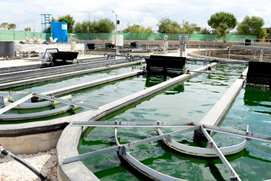The Spanish project Cenit Vida uses municipal wastewater as the basis for a revolutionary system of CO2 capture and the bioproduction of algae. It includes the participation of 13 companies and 25 research groups.
Engineering group Iberdrola Ingeniería and water specialist FCC Aqualia have presented the results of research carried out under their project Cenit Vida, a pioneering R&D initiative in the study of microalgae. The research consortium, which includes the participation of 13 companies and 25 research organizations, has worked on a CO2 capture system and the bioproduction of microalgae as part of a cutting edge program to take advantage of municipal wastewater.
This initiative represents an important milestone in the study of microalgae, which are considered to be of great importance due to their high energy content and enormous variety of potential uses for proteins, thickening agents, vitamins, enzymes, antibiotics, cosmetics, pharmaceuticals and chemical products. Using the algae as a valuation element helps scientists to take advantage of natural resources, waste products and contaminants for our water, energy and transportation.
This research seeks to create a new concept of a self-sufficient and sustainable bio-city (BioCAS according to its abbreviation in Spanish), by applying a new mentality that takes advantage of all possible uses for natural resources, waste and contaminants in urban areas.
